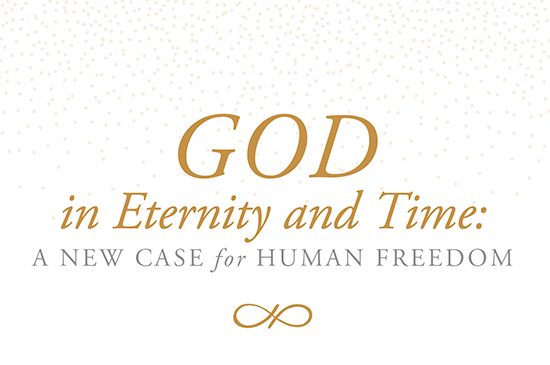
April-May 2023
The Discipleship Puzzle
------------------
|





God in Eternity and Time: A Book Review
By Joshua Colson
For decades, Dr. Robert E. Picirilli has published books that carried profound influence beyond Free Will Baptists into the greater Christian family. Picirilli introduced another such volume in 2022 with his release of God in Eternity and Time: A New Case for Human Freedom (B&H Academic). Picirilli’s fresh approach to this important subject has drawn critical acclaim, and Christianity Today recently listed Picirilli’s book among the most influential of the year and among the finalists for the best academic theology book. We applaud Dr. Picirilli for his continuing voice and influence within important theological conversations. The following review by Joshua Colson was adapted from a lengthier version on The Helwys Society Forum.
In this succinct yet scholarly work, Robert E. Picirilli brings a fresh perspective to the age-old debate regarding divine sovereignty and human freedom. That debate, as Picirilli views it, is often predicated “on the concept of God as formulated in metaphysical philosophy rather than on God as he reveals himself in the biblical narrative, mutually influencing and being influenced by the race of human beings he made to bear, or be, his image” (page xi). Consequently, theologians often read the Bible through the lens of whatever philosophical constructs they have adopted rather than allowing the corrective lens of Scripture to amend their philosophical constructs.
Regarding the debate over divine sovereignty and human freedom, Picirilli notes determinists ground their arguments in philosophically logical inferences that are, nevertheless, incompatible with God’s special revelation. Moreover, many non-determinists—Molinists and open theists, for instance—construct their arguments, whether consciously or not, on the same sort of philosophical speculations as determinists. Picirilli seeks to return the discussion to the Scriptures. Therefore, while the subtitle indicates Picirilli’s argument is new, it is new only insofar as he wishes to return us to those ancient words through which God reveals Himself. This posture, he argues, will reorient the way theologians think and speak of God—His nature, attributes, actions, relationships, and foreknowledge—as well as the nature of human freedom.
The book is divided into three sections. In part one, Picirilli explores the relationship between God, who is eternal, and creation, which is not. The nature of this relationship, he argues, reveals seemingly irreconcilable differences between metaphysical philosophy and biblical theology. Determinists, like Louis Berkhof and Paul Helm, resolve this tension by locating the acts of creation and incarnation in eternity. To claim God’s acts of creation and incarnation take place in eternity, however, fails to take seriously the biblical testimony that these acts truly took place in the time and space God created, that is, in history (pages 34, 42).
In contrast, Picirilli stresses that when we “read the Bible as it presents itself to us, as an account of God and humankind in space and time…then we begin to realize that there is a coinciding, some kind of identity between eternity and time. The unknown God of eternity is the God of time” (page 61).
What does this have to do with human freedom? Picirilli argues the biblical account clearly depicts God interacting with humans in an influence-response relationship. The God of the Bible—the God of eternity who is also the God of time—presents humans with choices, and they are free, if only by grace, to decide in more than one way. God wills to respond to such free choices with either blessings or curses. “One who misses that relationship misses everything. If one sees the meaning of the events in history as secondary or controlled or caused by God’s eternal purposes,” writes Picirilli, “one has turned reality on its head” (page 54; cf. 74). But that is precisely what determinists do when they contend God, in eternity, willed everything to come to pass.
In part two, Picirilli discusses God’s foreknowledge, which “appears to present a problem, at least a logical one, for human freedom and contingencies in the real world…if God knows in advance what will transpire in the real world, then what he knows must therefore transpire” (page 79). Determinists hold that God’s foreknowledge necessitates His foreordination of those events. Thus, they deny human freedom. Open theists also hold that God’s foreknowledge of future events necessitates His foreordination of those events. However, due to their commitment to human freedom, they deny God’s exhaustive foreknowledge.
Against both views, Picirilli argues (as he did in his earlier work Grace, Faith, Free Will) that divine foreknowledge does not preclude human freedom, nor does human freedom preclude divine foreknowledge. He aptly demonstrates divine foreknowledge does not equal causal necessity.
Building on his arguments from part one, Picirilli argues: “whatever God knew and decided in eternity, he knew and decided in consideration of what [humans] actually did in time. . . . Their choices were determined in real time and space in the very way such choices are determined, in the very way the biblical record depicts them—self-determined, that is” (page 92).
In this section, Picirilli also argues against Molinism, which holds that God, in eternity, decreed to arrange the world in such a set of circumstances that free agents would make the choices He desired them to make. “Like determinists, Molinists tend to focus on what God knew and decided and did in his eternal existence and then to allow that focus to dominate their view of what happens in time and space,” Picirilli writes. “Instead, we ought to focus primarily on what God does in time and space, as revealed in the Bible, and allow that vision to provide an understanding of what he has done in eternity” (page 175).
The final section, essentially, summarizes the preceding chapters and invites readers to accompany Picirilli on a walk through the Exodus narrative to illustrate the point he has been making all along: “the God at work in Exodus is God at work in eternity, and these two are one and the same” (page 197). That is, we understand God’s eternal purposes by His dealing with free agents in the time and space He created.
God in Eternity and Time demonstrates Picirilli’s deep and abiding commitment to Scripture as the final authority for all theological work. He calls us to hear God’s Word and humble ourselves before it, to let Scripture have the final word.
Prospective readers should be aware this work, published by B&H Academic, is geared towards an academic audience. Without question, Picirilli deals with heavy topics here, and heavy topics require the reader to do some heavy lifting. Nonetheless, Picirilli’s healthy use of illustrations, especially well-known biblical illustrations, and clear style make this work accessible to any pastor or layperson willing to put in the effort. This book can be purchased at Amazon or Lifeway.com.
|
|

